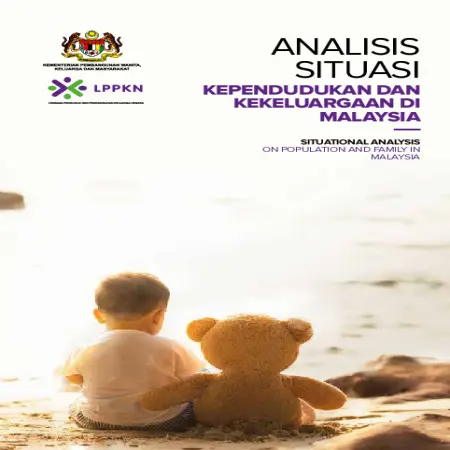Browse by Type
Results for Item type : "Research Report"
|
|
Analisis situasi kependudukan dan kekeluargaan di Malaysia
Item Type: Research Report
Editor:
Year: 01/12/2018
Abstract: The evolution of population and family policy in this country has begun since the implementation of the National Family Planning Programme by the National Family Planning Board (NFPB) in 1966. The main purpose of the programme was to reduce the population growth rate from 3% to 2% by 1985. Apart from Malaysia, other Asian countries also introduced
a family planning programme to its population in the 1960s where the earliest country to introduce the programme was India around the 1950s. As a result of the introduction of the family planning programme in the 1960s, the country’s gross birth rate has decreased from 36.7 babies in 1966 to 31.5 babies per 1,000 population in 1985. This directly makes the average annual population growth rate of the country declined from 3.0% per annum in 1966 to 2.8% per annum in 1980.
|
|
|
|
|
|
A Study on health status of youth in Malaysia
Item Type: Research Report
Editor:
Year: 00/00/2010
Abstract: This study analyzed health screening of 22,840 youths, who were distributed equally by ethnicity and camp sessions. Based on the analysis, 21.6% of youths were underweight, 18.1% pre-obese and 10.3% obese, with 0.3% perceived having body image disorders. With regards to sexual and reproductive health issues, 39.6% admitted viewing pornographic materials, 28.5% practiced masturbation, 6.5% engaged in premarital sexual relationships, 5.5% had multiple partners and 1.6% had been involved in homosexual relationships. History of abortion was discovered by 0.5% of the respondents. Almost a quarter of the youths were smokers, while 8.7% had consumed alcohol and 1.4% admitted taking drugs. The study also revealed that 6.2% of respondents reported to have past involvement in bully and 14.1% in fight. About 7.1% of the respondents revealed they had been physically abused while 1.2% of them had been sexually abused. Mental health problems were noted in 27.5% of the youths, with depression in 9.8% of the youths, anxiety in 20.7% and suicidal ideation in 11.8%. Psycho-social problems such as substance use, antisocial behavior, physical/sexual abuse and mental health problems among youth are interrelated with common risk and protective factors. Management of psycho-social problems in youths should be holistic; looking into risk and protective factors. Programs and interventions should focus on strengthening of protective factors among youth such as family connectedness and religiosity.
|
|
|
|
|
|
Action -oriented research and training for improved management of population programme
Item Type: Research Report
Editor:
Year: 00/00/1986
Abstract: This study was conducted with the aim to identify and clarify some of the management issues and problem involved in the implementation of family planning services to all strata across the country.It has also hopes to develop improved management concepts for the application to the family planning programmes. The case study covered three states in Peninsular Malaysia, namely, Selangor, Terengganu and Penang. Upon visiting NPFDB family planning clinics of the three states, 175 respondents are identified.
|
|
|
|







